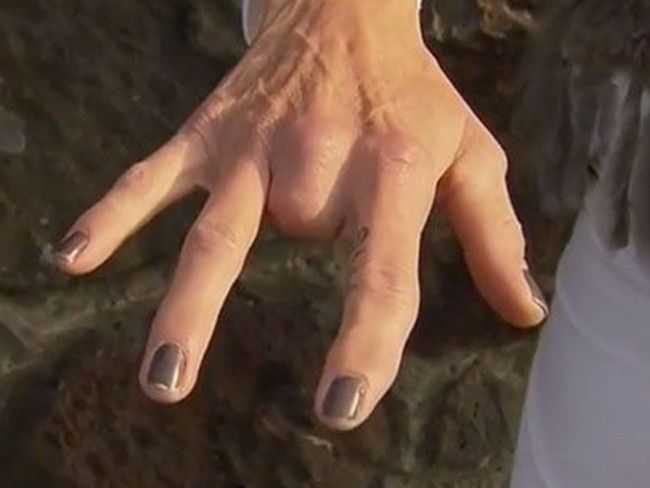Rita Panahi: Courts prioritising rights of violent offenders
GIVEN the drawn-out process and absurdly lenient sentences, I’m questioning whether it’s advisable for abused women to subject themselves to the Victorian justice system, writes Rita Panahi.
Rita Panahi
Don't miss out on the headlines from Rita Panahi. Followed categories will be added to My News.
- Courts are still failing violated women
- We can’t toy with domestic violence
- Feminists: Tackle issues that damage women
FOR the first time I’m questioning whether it’s advisable for abused women to subject themselves to the Victorian justice system.
I’ve long believed that no matter how challenging the process, the right thing to do, for both the community and for the victim’s recovery, is to hold the attacker fully accountable for their criminality.
But given the drawn-out process that often culminates in absurdly lenient sentences, I now wonder whether it is in the interests of an already traumatised victim to be retraumatised by a justice system apparently preoccupied with the rights of offenders.
I’ve always thought that if a loved one found themselves terrorised by a violent partner, I would advise them to involve the police as soon as possible and to get away from their abuser; but I’m no longer sure that I would encourage them to subject themselves to the court system.

It’s one thing to make a police complaint and seek some measure of protection via an intervention order but proceeding with a criminal case requires a great deal more from the victim.
For a distressed woman who is dealing with the emotional turmoil that comes from being abused by someone who is supposed to love them, the added stress of court proceedings is an enormous burden.
Then there is the fear that the thug they fear will become further enraged after he is charged or freed from a custodial sentence.
Leaving an abusive man is a dangerous business at the best of times but the risk is amplified when a volatile abuser who has shown a propensity for violence not only loses their punching bag but is furious about their liberty being threatened.
The women who are battered victims deserve better than to watch their abusers walk free from court with the proverbial slap on the wrist.
This week we learnt of another incident that is certain to further weakens the public’s faith in the judiciary.

Elias Radi walked into a Coburg nail salon on Remembrance Day last year and demanded to see his former girlfriend’s mobile phone. This occurred two months after the pair broke off their three-year relationship.
When the victim refused to tell him her password, Radi became violent.
He dragged the terrified woman out of the salon and on to busy Sydney Rd where he bashed her in full view of passers-by.
The victim was slammed against a wall, repeatedly punched in the face and put in a headlock.
Despite pleading guilty to unlawful assault and intentionally causing damage, Radi was sentenced in May to only one month in jail and an 18-month community corrections order.
I would have thought that was a gift for the 23-year-old. But he appealed immediately and consequently spent a mere two hours in jail.
And that is all the time he will spend behind bars for the violence he visited upon his former girlfriend.
On Monday in the County Court, Radi had his sentence reduced to only the 18-month community corrections order and 150 hours of unpaid community work.
The one month jail term was quashed entirely, despite the judge calling his actions “appalling”.
“I’m prepared to give you ... the chance to show you can rehabilitate.
“Incidents of this type cannot be condoned by the courts,” said the judge, who cited Radi’s youth and lack of prior convictions as reasons behind her decision.



I think that a man of 23 years is well into adulthood and should face the full force of the law, but Radi will be free to pursue a career in construction.
It wouldn’t be so grim if this was a rare example of soft sentencing but barely a week goes by where we don’t hear about a manifestly inadequate punishment handed to a violent offender.
Two months ago I wrote about former footballer Justin Murphy’s hopelessly inadequate sentence of six months for terrorising his former partner, Jill Scott, who was harassed, stalked and threatened before she was attacked with a blowtorch, suffering burns so severe that she lost a finger.
How can we send the message that violence against women won’t be tolerated if those guilty of brutalising their current and former partners are given such pathetically lenient sentences?

Domestic Violence Victoria CEO Fiona McCormack has praised the Andrews government for its “commitment to significantly reduce the rate of family violence in Victoria” and warns that women must feel confident in the justice system.
“We know that to do this we need all our institutions to take family violence seriously and to hold perpetrators responsible for their use of violence,” she said.
“It’s critically important that women who are living with family violence have confidence that the justice system will keep them safe and hold perpetrators of family violence to account.”
The Victorian government has made tackling domestic violence a top priority but that effort is undermined when the judiciary does not hold violent offenders fully responsible.
Sentencing that is wildly at odds with community expectations does not engender confidence in the justice system.
The interests of battered women must always come before the rights of their abusers.
— Rita Panahi is a Herald Sun columnist. Read her latest blog posts.



